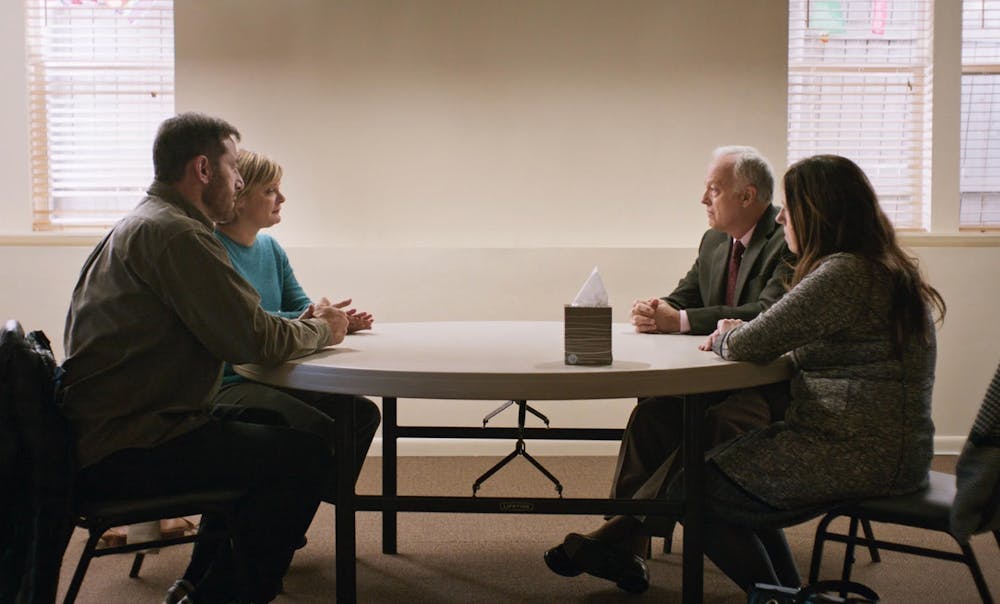From: Silver Screen
REVIEW: ‘Mass’ shines a light on the perils of grieving

With the release of “Mass,” Fran Kranz has become one of the most promising new directors for years to come. His debut film is a uniquely thoughtful and engaging depiction of grief.
The movie unravels in the form of an intimate conversation set in a small-town church basement between two sets of mourning parents who have both lost their sons as a result of a school shooting. Jay (Jason Isaacs) and Gail (Martha Plimpton), whose son was killed by the perpetrator, sit down to have a face-to-face conversation with Linda (Ann Dowd) and Richard (Reed Birney), the parents of the shooter. In an attempt to reach a state of reconciliation and closure, the four of them try to explain and process the events surrounding the day of the shooting.
By portraying its characters with an enormous amount of empathy, “Mass” manages to have an intensely emotional impact. The film maintains a constant sense of drama without ever verging into exploitative territory by garnering viewers’ sympathy with its beautifully written roles. All too often, it seems that films want audience members to choose sides when characters are in any sort of conflict with one another. “Mass” sidesteps this temptation by allowing these four grieving individuals to air out their many complex emotions without ever feeling critical toward them, even as the two sets of parents understandably judge and question each other.
The four leads compassionately portray their roles with immense introspection and devastating sincerity. One central conflict that recurs throughout the film is Jay and Gail wrestling with the anger that they feel toward the people who raised their son’s killer, while also understanding the sorrow that Linda and Richard are going through from the loss of their child. This tension continuously builds throughout the film, ultimately boiling to the surface as Jay lashes out in a tear-filled tirade. This is perhaps Isaacs’ best scene. He performs with a great deal of emotional nuance that ultimately comes off as more despondent and grief-stricken than accusatory or vindictive. This only serves to bolster the sympathy he garners from Linda and Richard as well as the audience.
Dowd’s performance as Linda is equally memorable as she deals with the guilt of her son’s actions and her self-doubt regarding whether or not she could have done something to help him before he caused so much heartbreak. It’s quite clear from the start of the conversation that she’s willing to do anything to absolve herself of this self-imposed culpability, but she feels hopelessly unsure of how to go about fixing the situation. Anyone who has grieved has likely felt similar emotions regarding the prospect of being able to go back in time to stop whatever is causing their sadness. In this way, “Mass” reaches beyond the original scope of its subject matter and transcends into a uniquely universal portrayal of grief.
In addition to being thematically poignant, Kranz’s debut feature is a technical master class. The director makes excellent use of the location and limited space available to him. From the very outset of the film, establishing shots of the building’s exterior and the surrounding area set the stage beautifully for the scenes to come. The fact that “Mass” takes place almost entirely within a tiny room in a church basement only adds to the deeply personal atmosphere that Kranz seamlessly creates. The limited area gives each scene an added feeling of intimacy and potential combustibility that feed perfectly into the movie’s central themes.
Silence is also used to great effect, inviting audience members to genuinely process their feelings alongside the characters on-screen during the gaps between the dialogue. Every aspect of Kranz’s direction feels meticulously selected without sacrificing the film’s natural feel, a very impressive feat to pull off from a director with such limited experience.
“Mass” successfully delves into some of the most painful elements of grief without feeling overly sentimental or insensitive. The film respectfully and honestly illustrates the thoughts and feelings of its characters with an equitable amount of understanding and lack of judgment. Moments of discomfort are never shied away from. Kranz allows his movie to naturally unfold rather than imposing some definitive point of closure upon its characters or the audience. In a market saturated with mass-produced, inauthentic melodrama, “Mass” is a refreshing representation of honest human emotion.
“Mass” was released in theaters today and is showing at Landmark's E Street Cinema and the Angelika Film Center & Café at Mosaic.
Correction: A previous version of this article contained the incorrect release date of "Mass."




